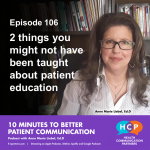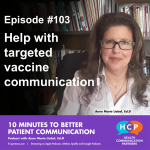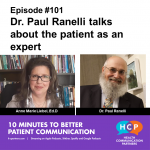Tech companies and leaders are trying to help digital health solutions live up …
[Read more...] about 4 mini-lessons about digital health equity

Tech companies and leaders are trying to help digital health solutions live up …
[Read more...] about 4 mini-lessons about digital health equity

You already have plenty of knowledge and experience about patient education. But …
[Read more...] about Episode 106 Two things you might not have been taught about patient education

I’m currently working on a targeted vaccine communication campaign for a …
[Read more...] about Episode 103 Help with targeted vaccine communication

During the pandemic, many of us turned to our pets for stress-relief and …
[Read more...] about Episode 102 How our pets can help us talk about death

I’m glad to welcome back to the show Pharmacist and Social Pharmacy Professor …
[Read more...] about Episode 101 Dr. Paul Ranelli talks about the patient as an expert
Lots of research-based resources. No deficit perspectives.
